
My Father's Penis
by NANCY K. MILLER
When I was growing up, my father wore what we used to call string pajamas. Actually, I only remember the bottom part of the pajamas, which, as their name might suggest, tied with a string at the waist. (On top he wore a ribbed sleeveless undershirt that tucked into the pajama bottoms.)
The pajamas, made of a thin cotton fabric, usually a shade of washed-out blue, but sometimes also striped, were a droopy affair; they tended to bag at the knees and shift position at the waist with every movement. The string, meant to hold the pajamas up, was also meant to keep the fly -- just a slit opening in the front -- closed. But the fly, we might say modernly, resisted closure and defined itself instead by the meaningful hint of a gap.
As my father wandered through the apartment in the early mornings, performing his domestic rituals (bringing my mother coffee in bed, making my sister and me breakfast in the kitchen, shaving, watering the plants), this almost gap never failed to catch my eye.
It seemed to me as I watched him cheerfully rescue the burning toast and pass from room to room in a slow motion of characteristic aimlessness (memorialized in our family codes by the Yiddish trope of draying), that behind the flap lay something important: dark, maybe verging on purple, probably soft and floppy. I also suspected it was hairy in there; I was pretty sure I had glimpsed hair (he had hair everywhere, on his back and shoulders, why not there).
 I don't think I wanted to see it -- "it" had no name in my ruminations -- but there was a peculiar way in which its mysterious daily existence behind the slit in the pajama bottoms loomed large in my prepubescent imagination as somehow connected to the constant tension in our family, especially to my mother's bad moods.
I don't think I wanted to see it -- "it" had no name in my ruminations -- but there was a peculiar way in which its mysterious daily existence behind the slit in the pajama bottoms loomed large in my prepubescent imagination as somehow connected to the constant tension in our family, especially to my mother's bad moods.
Growing up, I had only the vaguest notions of sex; I can still remember my utter astonishment when, sitting on the living room couch and feeling vastly sophisticated, I learned from my mother that a penis had to become "erect" to enter a vagina (I had never really thought about how the man's penis -- in the redundant but always less than instructive language of hygiene classes -- gets into the woman's vagina). So that several years later when in college I finally had a look at my first penis (this was no small surprise), I realized I had never visualized the thing to myself at all.
Almost forty years after the scene of these memories, I find myself again, as a middle-aged therapized intellectual, thinking about my father's penis. Now, living alone after my mother's death in the same apartment, my father, stricken with Parkinson's disease shuffles through the room draying. Boxer shorts have replaced the string pajamas, but the gap remains the same and it's still dark in there. But it's not the same. I have seen his penis. I have even touched it. One day when his fingers had grown so rigid he couldn't, as he puts it, "snare" his penis, he wanted to get up to go to the bathroom. It was late and I wanted to go home, so looking and looking away, I fished his penis out from behind the fly of his shorts and stuck it in the urinal; it felt soft and a little clammy.
Shirley, the nurse's aide who takes care of my father, reported one day that when she arrived in the morning, she had found my father in the kitched "bare-bottomed" and cold. "His -- was blue," she said (the cadences of a slight Carribean accent made the word hard to understand over the phone); "I rubbed it until it turned pink. Then he felt better." Rubbed his penis? But what else, in the vicinity of a bare-bottom, of two syllables, could have gone from blue to pink? Did it respond to her rubbing? Become erect? The mystery returns, What do I know?
Shirley and I talk about my father, his care. The apartment, despite her efforts, smells of urine. There's no missing this penis-effect. One day, in the middle of eating dinner, his back to me, he demands his urinal from Shirley, which he uses while at the table. Shirley buys him new boxer shorts on 14th Street. Six dollars, she says. Apiece? I ask. No, three Fruit of the Looms to a package.
This is the condition of his remaining at home (he gaves me a pained look at the mention of going to a "home" that silences me): to get out of bed and make it to the bathroom without falling, or to use the urinal that hangs like a limp penis from the walker he despises (he shows his superiority to his infirmity by carrying the walker in front of him instead of leaning on it).
When these solutions fail, Ellen, the neighbor who brings him his daily New York Times, says "he peed himself" (my father always talks more elaborately about "the difficulty of urination," of responding in time to the "urgency of its call"). The newspapers now, like the New Yorkers to which he maintains his subscription, and which remain unopened in their plastic wrappers, pile up unread in the living room. I throw them away in my weekly sweep through the apartment.

In "Phallus/Penis: Same Difference" (great title) Jane Gallop writes: "The debate over Lacan's and beyond that, psychoanalysis's value for feminism itself centers on the phallus. Yet the phallus is a very complicated notion in Lacan, who distinguishes it from the penis. The distinction, however, seems to resist clarification." For awhile after touching my father's penis, I went around thinking smugly that I would never again confuse penis and phallus, boasting that I had transcended the confusion. Phallus was the way my father could terrify me when I was growing up: throwing me across the room in a blind rage because I had been talking on the phone -- endlessly, it's true -- when the hospital called to say his mother was dying; knocking me down in an elevator for staying out late one night with my college boyfriend. Phallus was tearing the pages out of the typewriter because I hadn't left wide enough margins on my term papers; making me break a date with a cab driver who had picked me up in London on my first visit there (but Daddy, he's Jewish, the son of a cantor!)
Penis was that dark-veined, heavy thing lying there against strangely elongated, even darker balls; hanging between emaciated but still elegant thighs. It made problems for me, but they were finally prosaic, unmediated by concepts and the symbolic order. My father doesn't have the phallus; no one does, Lacan said. But, Gallop writes in The Daughter's Seduction, "the need, the desire, the wish for the Phallus is great. No matter how oppressive its reign, it is much more comforting than no one in command." So now I decide, say no, and yell; I am responsible for the rest of his life ("it's for your health and welfare," he used to say as a his cover for the exercise of an arbitrary authority); maybe I, failing the penis, have my chance at the phallus.
Months after writing this, I come into my father's room. I think I have put an end to all these speculations (penis, phallus, castration, etc) but when I find him sleeping completely naked, stretched out like an aged Endymion across a hospital bed, I can't resist. His hand is resting in his lap, his penis tucked away out of sight, hidden between his thighs. I move closer. "So what does it look like?" my sister asks. I don't answer, not only because I want to play big sister one last time, because I'm not sure I can say what it is I've seen.
 When I wrote "My Father's Penis", I had been thinking more about penises than fathers (or so I thought at the time). Mira Schor, who is a painter and a critic, had done a slide-show lecture on representations of the penis in painting, and I conceived my piece originally as a kind of footnote to her panoply of members -- the geriatric extension of her taxonomy. But I was also writing in the aftermath of an intensely charged academic performance in which the status of "experience" in feminist theory had been challenged with a certain phallic -- what would a better word be? -- insistence.
When I wrote "My Father's Penis", I had been thinking more about penises than fathers (or so I thought at the time). Mira Schor, who is a painter and a critic, had done a slide-show lecture on representations of the penis in painting, and I conceived my piece originally as a kind of footnote to her panoply of members -- the geriatric extension of her taxonomy. But I was also writing in the aftermath of an intensely charged academic performance in which the status of "experience" in feminist theory had been challenged with a certain phallic -- what would a better word be? -- insistence.
When it then became a matter of publishing "the penis" (it seems impossible to invoke the title or its contents without getting caught in the spiral of catachresis) in Refiguring the Father, I felt that I had inadvertently found a destination for it: that the fragmentary essay, because of its mixed origins, born of the troubled intimacies of the autobiographical penis and the theoretical phallus, had unexpectedly come full circle back to feminist revision. But not perhaps back home.
Had my father still been able to read, I would never have written about "the penis." By going public with the detials of domestic arrangements on Riverside Drive, I was flying in the face of the parental injunction not to "tell" that had haunted my adolescence and continued well into my adult years; the panic my parents felt that they would be exposed by us; the shame over family secrets. But he was down in his reading to the occassional newspaper headline and, I think, at his end, despite a finely honed personal vanity, beyond caring. He had become no longer himself, and I need to mourn his disappearance.
My father died before this piece appeared in print. He died, I'm tempted to say, of the penis: at home, as he had wanted, after eating ice cream and watching public television, in the aftermath of a grueling seven-week stay in the hospital that followed a violent urinary tract infection. I dealt with -- talked about, looked at, touched, raged at -- his penis until the very end.
And until the very end, the penis/phallus connection became impossible to sever. In the hospital, it was war between his penis and the doctors' discourse; or rather, my attempt to stand in as phallus for his penis -- the rights of his body -- against their authority to determine the course of his life; their wish for him to live, against his entire system's disarray (my wish for him?).
When I read one day on my father's chart in the intensive care unit, "Responds only to pain," I found it hard to share the doctor's jubilation over the signs of life dotting the monitor above his respirator. "What do you want me to do," she hissed at me across a network of tubes mapping his body, "kill your father?"
Nancy K. Miller is a distinguished essayist and critic who penned this essay in 1991.
 louise bourgeois' fillette
louise bourgeois' fillette






"The District Sleeps Alone Tonight" - The Hampdens (mp3)
"Social Suicide" - The Hampdens (mp3
"Croupier" - The Hampdens (mp3)
"The Last Party" - The Hampdens (mp3)
Hampdens website

 FILM
FILM  Wednesday, May 27, 2009 at 5:16PM
Wednesday, May 27, 2009 at 5:16PM 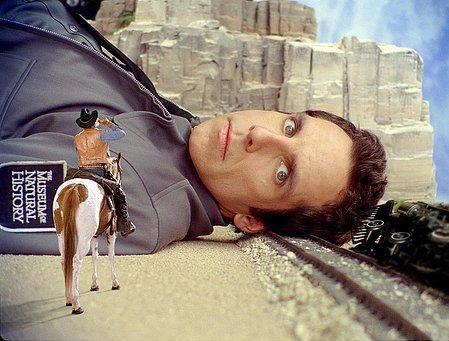
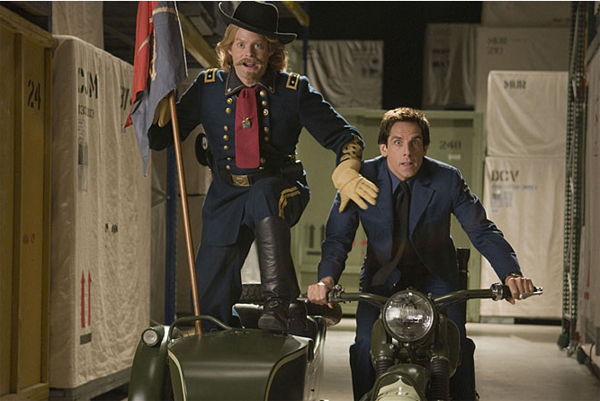
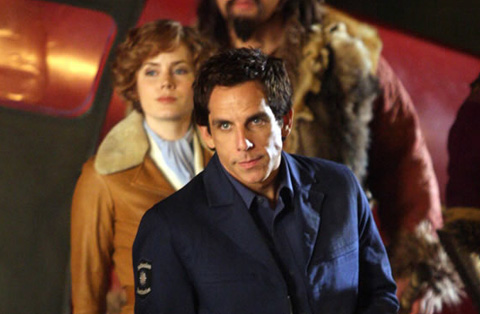
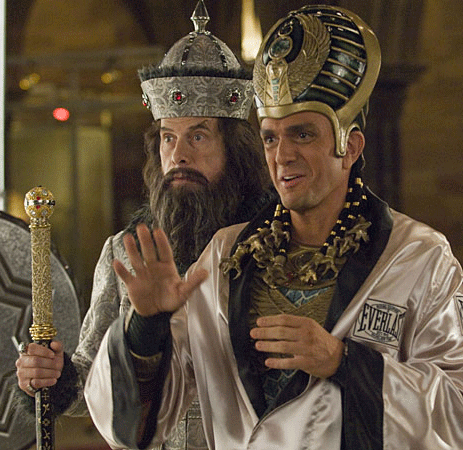
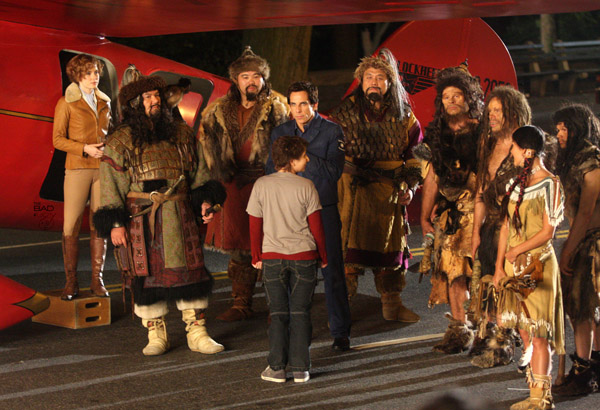
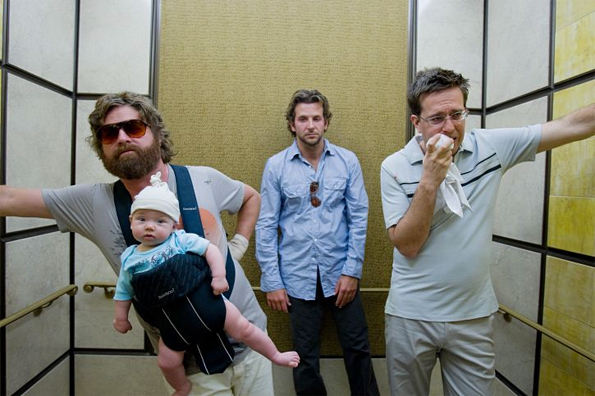

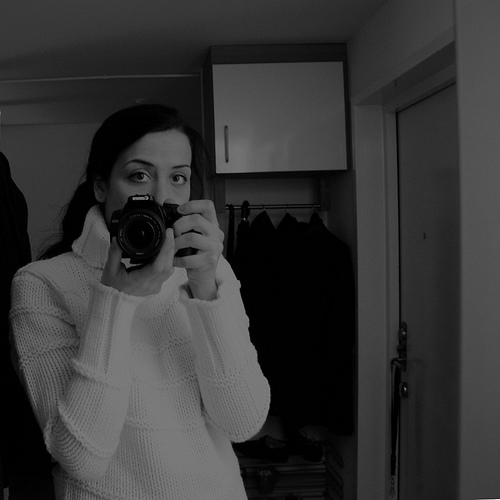

 night in the museum,
night in the museum,  the hangover
the hangover 










































